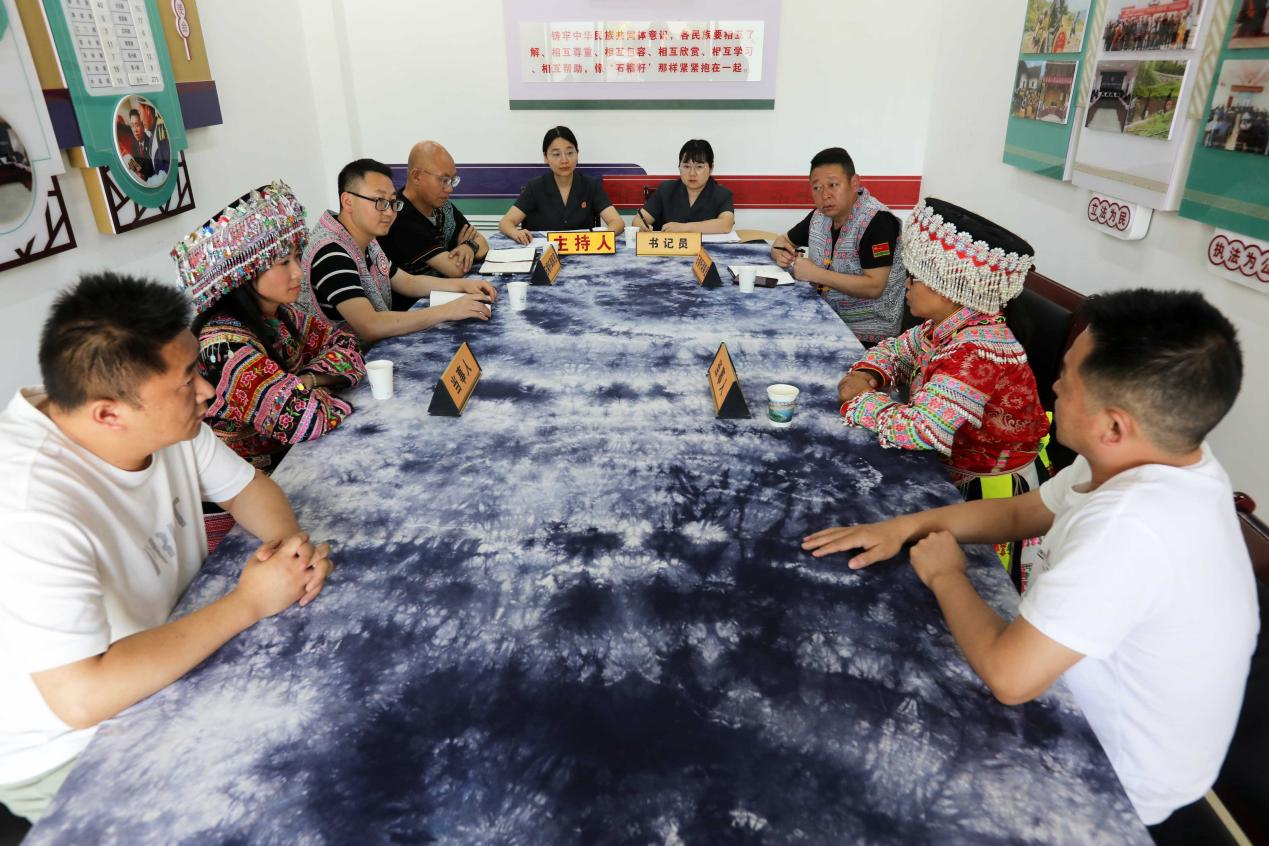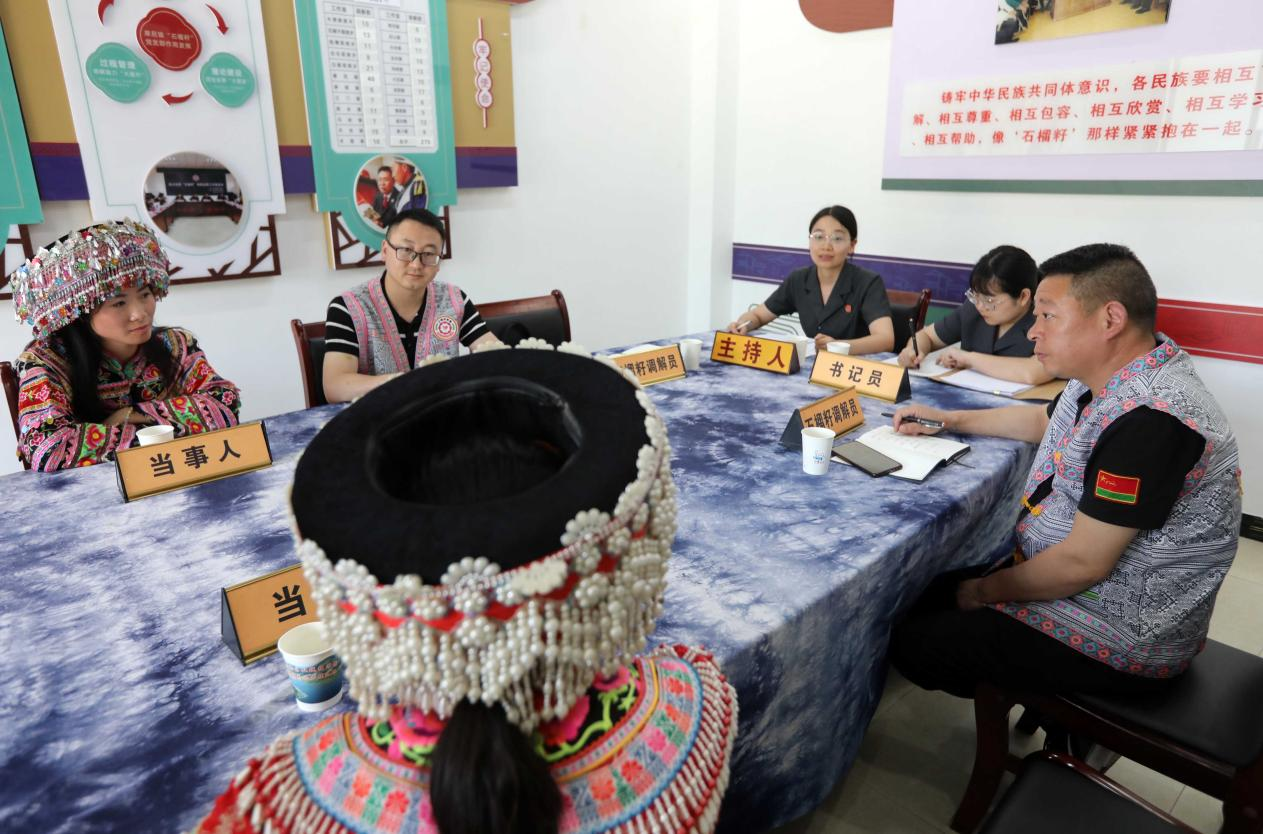
 Print
Print
“Pomegranate Seed” Mediation Model: A “Golden Key” for Diversified Dispute Resolution in Ethnic Areas
2025/06/16 14:48 Origin:cced.cn
Recently, in a remote village in Luzhou, Sichuan, a complicated dispute was successfully mediated. The cause traced back to an invalid "private settlement" agreement made five years ago.

Chen (alias) and Zhou (alias), residents of Moni Town, Xuyong County, Luzhou, had a child after marriage registration. Years ago, Chen left for migrant work after a quarrel and never returned. Zhou, feeling abandoned, cohabited with Zhao (alias) through relatives' introduction. Zhao not only cared for Zhou's child but also supported Zhou and her family. When Zhou died of illness five years ago, Chen returned to Xuyong. As Zhou's legal spouse, Chen shirked funeral responsibilities and even planned to leave again, ignoring the child's upbringing. Lacking legal awareness, Zhao and Chen signed an agreement: Zhao would bury Zhou, raise the child, and inherit Zhou's property, while Chen waived all rights. Years later, Chen claimed the agreement invalid and sued to reclaim the child and property.
After accepting the case, the court found parts of the agreement invalid and violating the Civil Code. "We chose mediation because the case involves complex legal relations, and both sides may lack legal knowledge. Mediation can explain legalities, avoid psychological harm to the child, and resolve emotional conflicts for a thorough settlement," said Xiong Yanbing, head of the Moni People's Court in Xuyong. As the case occurred in a scattered ethnic minority area, inviting family members and mediators merged legal provisions with ethnic customs, enhancing legal awareness and reducing similar disputes.
This exemplifies the "Pomegranate Seed" mediation model in Xuyong. Located at the junction of Sichuan, Yunnan, and Guizhou, Xuyong is home to 34 ethnic groups, including Han, Miao, Yi, and Hui. Historically, unbalanced development and cultural/language gaps made disputes in scattered ethnic areas prone to lingering conflicts, even triggering clan or ethnic tensions.

In 2017, when handling ethnic-related cases, the Moni Court of Xuyong found that mediations involving respected elders and ethnic customs were more acceptable, resolving disputes efficiently. "I worked at the Xuyong Ethnic and Religious Affairs Bureau then. We collaborated with courts to develop the 'Pomegranate Seed' model: specialist-mass integration, morality-law governance, and standardized system," said Lan Jie, Executive Deputy Director of Xuyong County United Front Work Department. This model replaced single approaches (solely legal or traditional) with a "two-laws integration" mechanism, uniting state law and ethnic customary law.
The Moni Court formed a "Pomegranate Seed" team with professional judges, professional jurors, and featured mediators. Lan Jie became a mediator and established the "Ajie" Mediation Studio, using local culture and language to resolve disputes.
The model's highlight is blending state law, folk mediation, and ethnic customs. In Xuyong, the "three bowls of wine" story prevails: Wei and Yang from Shuilao Yi Township fell out after a traffic accident. Wei's son caused Yang's injury, and Yang took Wei's cow for compensation. Instead of ruling, the judge invited an Yi clan leader (a 'Pomegranate Seed' mediator) to mediate. Following Yi custom, Yang served three bowls of wine—each drunk by Wei, Yang, and the mediator, who then smashed the bowls—sealing the agreement and reconciling the families.
In 2019, the Moni Court was honored as a National Unity and Progress Model Collective. By 2021, the model spread provincewide, reducing ethnic-related disputes by nearly 40% and petition cases by 35% in Xuyong, with mediation success rates rising from 50% to 90%. It has been adopted in Mianyang, Yibin, Liangshan, and other Sichuan areas, even adapted in Inner Mongolia, Xinjiang, Tibet, and Yunnan, promoting social harmony.
"Originating from Xuyong's Moni Court, the 'Pomegranate Seed' model has become a key tool for diversified dispute resolution, innovating the 'Fengqiao Experience' in Sichuan," said an official from the Sichuan Provincial Ethnic and Religious Affairs Commission. It enhances grassroots governance, marking a step toward modernized governance in ethnic areas. (Text/Wang Weidong, Photos/Wang Lei)
Copyright © CCEDN.COM.CN. All Rights [京ICP备2024049485号-1] Tel: 0086-10-88820521

